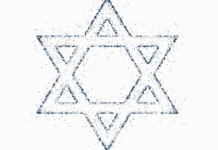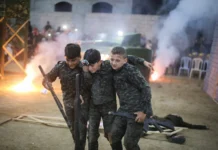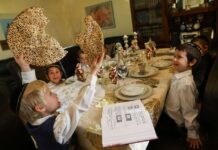Yaakov was leaving one wicked man, Lavan, and was heading towards another wicked man, Eisav his “brother”. In the last Parasha it is written “and the angels of HaShem met him” (“וַיִּפְגְּעוּ-בוֹ,מַלְאֲכֵי אֱלֹהִים”). When Yaakov was heading back towards Canaan, he sent these two Angels before him to deliver a powerful message to his bother Eisav and to warn him. Yaakov had Angels who served him both in and out of the Holy Land. Rashi says that Yaakov had literally merited his own set of Angels, using the word “Mamash” (“ממש” – literally) as the word stands for “MeMa’asim Shelo” (“ממעשים שלו”), meaning from his own deeds. The Ramban teaches us that the Torah records the meetings between Yaakov and Eisav in order to guide future generations in dealings with those who wish to harm us. Today we see that these are Eisav’s descendants who want to harm as well as the Arabs (Yishmael’s descendants). It is amazing to see that the word “Vayishlach” (“וישלח” – sent) has the same numerical value of 354 as the lunar calendar that the Arabs go by. The word “Vayishlach” also represents two words “Ve’Y” “וי”, “Shalach” (ה’ שלח), meaning HaShem sent the Angels.
The Torah write “Eisav his brother” (“עֵשָׂו אָחִיו”) to teach us about this profound meeting. The Torah writes “Eisav his brother”, placing first his name and then his description (brother), meaning he is still the same wicked man Eisav, and only after Yaakov gave him gifts he acted like his brother. Most importantly we notice that the name of HaShem appears before Eisav’s name, “El-Eisav” (“אֶל-עֵשָׂו”), to teach us that HaShem will be there (his Angels) with Yaakov as he provided him the Angels as protection. From here we also learn that we should first try peaceful ways before war, but always understand that peace can only be established with strength.
By sending the Angels first, Yaakov was conveying a message to Eisav, telling him that he is guarded by HaShem through the Angels. Yaakov said to his brother “I am your servant” (“עַבְדְּךָ”) in order to appease him and soften his heart. Yaakov was later punished for using the terms “slave”, “servant”, and “master” three times (all together 8 times) while referring to his brother Eisav. We also notice that Yaakov told Eisav (verse 33:11) that “I have everything”; the word everything in Hebrew is “Kol” (“כל”) and has a numerical value of 50, alluding to the number of years Yaakov has left to live. He met Eisav again when he was 97 and passed away 50 years later at the age of 147. We also learn from the word (“כל”) “Kol” (with all) that the 12 tribes will come from Yaakov, as the number their combined is letters of all twelve tribes’ names is 50.
Our Sages say that HaShem asked Yaakov why he was using the Angels and trying to appease his brother; “Don’t you trust that I, HaShem will protect you?” Yaakov answered that he was frightened since he “took” both blessings as well as Leah to be his wife (as she was destined to marry Eisav). HaShem said to Yaakov that since he humiliated himself eight times, referring to his brother as his “master”. His offspring will be punished and be ruled eight times by a kingship from Eisav offspring, before the first Jewish/Israeli king (shaul) will rule Yaakov’s sons (Beni Yisrael). Yaakov asked HaShem to space out this curse as he spaced out the gifts to his brother, so his sons (Beni Yisrael) will not lose their faith.
The word “Vayishlach” (“וישלח” – sent) is an acronym of ויעקב שלח לעשו חיל and Yaakov sent angels to Eisav.
Yaakov said to his brother, via the Angels, “I lived with the wicked Lavan (“לבן”) and I was late to return” (”עִם-לָבָן גַּרְתִּי, וָאֵחַר עַד-עָתָּה”). The Midrash teaches us that he meant to tell his brother “I managed to live with a very wicked and bad man, who was the biggest cheater and a swindler than even you. Yet I managed to overcome him and live as a holy Jewish man who kept all the Mitzvot even while living with an idol worshiping man. Yaakov said to Eisav that if he chooses peace, he, Yaakov is ready for it. But if he chooses war, he is ready for it as well. The word “Va’Echar” “וָאֵחַר” (late) means that Yaakov waited until he amassed a fortune in order to give his brother gifts as “Maaser” (“מעשר”) a tenth of his fortune, since he did not give “Maaser” while he was living outside of Canaan for 36 years. It is worth mentioning here that Lavan was Bilam’s grandfather and Beor was Bilam’s father and Yitro was Balak grandfather.
The numerical value of the word “Garti” (“גרתי” – lived) is 613 and it spells the word lived “Tariag” (תרי״ג), alluding to the six hundred and thirteen Mitzvot he kept. We learn from the Kabbalah that Mitzvot are Angels, and they will escort us to heaven upon our earthly death. The Zohar explains that Yaakov sent these two Angels (Mitzvot) to his brother, and he beat him, as in return Eisav sent 400 of his own angels. Yaakov then said “Garti” (“גרתי” – lived) with Lavan, alluding to that he can and will beat Eisav with his 613 Angels.
What Yaakov was also saying to Eisav was that he is very rich with all his earthly fortunes but not as a result of the blessing from his father (the one Eisav blamed Yaakov for). Yaakov said the fortune he amassed is great and powerful with HaShem’s blessing. He said “I have an ox [from blessings of Yaakov to his son Yosef (“יוסף”) and a donkey (from blessings of Mashiach (“משיח”) Ben David]”. The question is why Yaakov said he has an Ox and a Donkey. We know that he amassed a huge fortune and large amount of cattle. This comes to teach us that Yaakov was telling Eisav that he is ready to bring the Mashiach now, if Eisav will cooperate. We know that through our Forefathers, Mashiach Ben Yosef is represented by an ox and Mashiach Ben David will come on a donkey. Yaakov also said I was a “Ger“ (“גר”) with Lavan, to teach us that he never assimilated into the local citizens. Yaakov told his brother that none of his father’s blessing came true, and that all he owned came from “Shamaim” (“שמײם”), as he was really blessed by HaShem. This was done in order to minimize the sale of firstborn rights by Eisav. The cures are found in Mashiach Ben David, who will be a “poor man riding on a donkey”, and Mashiach ben Yosef who will fulfill the verse (about Yosef), “his first born bullock, majesty is his”.
The Zohar says the meaning of the “Ox and the Donkey” are actually the Satan and his wife (l.i.l.i.t), as Yaakov was hinting to Eisav that he has full control of them after “defeating” Lavan. The ox is related to Eisav, who was left of Yitzchak in a negative way. The donkey is related to Yishmael, who was to the right of Avraham in a negative way. We also learn that “You shall not plow with an ox and a donkey together” alluding to inequality. The Baal HaTurim says, “You shall not plow with an ox and a donkey”, meaning a non-kosher animal (donkey) with a kosher animal (ox). This alludes to two differences in powers and abilities as well as the ethic that a righteous man should not enter into partnership with a wicked man (a none fearing G-D man).
It is important to mention here a profound teaching by the Zohar regarding Yaakov’s claim, of “keeping all 613 Mitzvot”. The word “Tariag” alludes to the six hundred and thirteen Mitzvot Yaakov kept, and such statement is problematic. Yaakov could not keep all 613 Mitzvot given that he was out of the land of Israel, did not have the Beit-Hamikdash, Kohanim, Levites and sacrifices. Many Mitzvot could only be performed when all the above conditions exist. The Zohar explains that the use of the word “kept” alludes to learning about all 613 Mitzvot, and not necessarily actually keeping them. What Yaakov was saying to Eisav is that his Mitzvot will win against his four hundred men. The Zohar says that by taking 400 Mitzvot to win against Eisav’s 400 men (measure for measure) Yaakov will remain with 213 Mitzvot. The Gematria of the words “El Yaakov” (“אל יעקב”) is 213, alluding to having HaShem’s protection of Yaakov against Eisav as we see with the placement of God’s name before Eisav’s name, “El-Eisav” (“אֶל-עֵשָׂו”).
Yaakov divided everything that he owns and cherish into two camps, placing them each camp apart by a day (24 hours) from each other, in order to save the remaining camp behind, in the event of a war with Eisav. This is to teach us also that if we face difficulty, we should always space it in order not to be followed by more predicaments. He knew that if the first half will be attacked, the second half will be able to beat Eisav’s soldiers or avoid war. Yaakov also knew from his prophecy that if his brother kills him, he too (Eisav) will die at the same time (as it did later on) and so he acted accordingly. We also learn about the 24 hours an amazing secret. The number 24 hints to the number of books in our Torah, known as “Tanach” (תנ”ך – the bible). The word “Tanach” (תנ”ך) stands for Torah 5 books (“תורה”), Neviim 8 books (“נביאים” – prophets) and “Ketuvim” 11 books (“כתובים”- writings). Interesting to point out that the best gold is 24 Karat (a measuring the purity of gold) as the Torah known as Gold! As we mentioned our day is 24 hours long and each hour our world turns (counterclockwise) Earth spins on its axis (approx. 23.5°) once in every 24 hour day. At Earth’s equator, the speed of Earth’s spin is about 1,000 miles per hour 24K miles a day interesting… all by HaShem!
In verse 32:12 we learn a profound life lesson by Yaakov’s statement and request to HaShem. Yaakov pleads with HaShem to “הַצִּילֵנִי נָא מִיַּד אָחִי, מִיַּד עֵשָׂו” save him from his brother Eisav. From here we learn that some of our so-called “brothers” we need to be careful of, and we sometimes need to be saved from them as they pretend to be our brothers but really are behaving as Eisav. We see evident of this “brotherly” behavior with members of the Israeli parliament who doing all they can against our Torah and HaShem will, these are the one we should ask to be “saved” from as Yaakov Avinu taught us.
The Torah writes that Yaakov took his two wives, two maidservants, and his eleven kids at night. This is odd since he had twelve kids (11 boys and 1 girl), why it is written only eleven? We learn that he hid Dinah from Eisav. We also learn here that at this point Binyamin was not yet born and so he is the only one who never bowed to Eisav as all the other did. Binyamin merited the “Zechut“ (“זכות”) to have Bait HaMikdash (“בית המיקדש”) built in his portion of land in Israel. When Yaakov crossed the Jordan River that night, he forgot “small jars”, these jars were the oil for Hanukkah. As a result Yaakov remained alone “fighting” with Eisav’s guardian Angel all night till dawn, eventually defeating the Angel. It is worth mentioning that Yaakov was the only one who could defeat both Angels and humans alike. Yaakov went back to insure the miracle of Hanukkah to his future generations. Yaakov went to the other side of the river and returned to bring them to Beni Yisrael.
After hours of struggling, the Angel hurt Yaakov’s hip. Our Sages explain that he dislocated his hip and because of that we are not allowed to eat the sciatic nerve (“גיד הנשה”) in cattle. Our Sages say that there is another reason for the Angel hurting Yaakov’s hip; to punish him for marrying two sisters. Eisav’s Angel finally understood that he couldn’t overcome Yaakov and he asked to be “freed” him and to be sent back. Yaakov refused to do so, asking the Angel to first bless him since he was Eisav’s Angel. He asked his to reverse Eisav’s anger and his will for revenge. Our Sages say that Yaakov was asking Eisav’s Angel to allow all the past blessings that Yitzchak blessed him with to be validated again, “וַיֹּאמֶר שַׁלְּחֵנִי, כִּי עָלָה הַשָּׁחַר; וַיֹּאמֶר לֹא אֲשַׁלֵּחֲךָ, כִּי אִם-בֵּרַכְתָּנִי”. We learn this from the word “Berachtani” (“בֵּרַכְתָּנִי”) that Yaakov used in past tense, “I will not let you go, only if you bless me”. The Zohar explains that the “fight” that lasted all night was really a fight between Yaakov’s good and evil inclinations.
Eisav’s Angel begged Yaakov to let him go since dawn was approaching. The Angel was telling Yaakov that he had to go back and recite praises/songs to HaShem in Heaven. As the Torah writes, “Let me go, for the day broke” (“וַיֹּאמֶר שַׁלְּחֵנִי, כִּי עָלָה הַשָּׁחַר”). Yaakov asked the Angel to reveal his name but the Angel refuses to do so, saying that Angels only have a temporary name for the mission they were sent to accomplish. Since he failed in his mission he didn’t want to be known by that name to anyone, as it is shameful for an Angel. We notice here that the Angel asked Yaakov for his name; this is a very “strange” question, as he already knew it. This comes to teach us that our name carries a unique blessings and Divine purpose, and it is being transferred to our children for generations. This is in order to continue HaShem’s blessings to our Forefathers, as it is written in the Torah, unlike Angels who are named for one task at the time, and do not pass their names to others as they do not have children. It is worth mentioning here that this was one of Moshe’s points of contention while arguing with the Angels on Mount Sinai at the time of receiving the Torah. Our Sages say that the reason the Angel asked for Yaakov’s name, was to reveal to Yaakov that his name is about to change by HaShem.
The Angel gave Yaakov a second name ISRAEL (“ישראל”). The name Israel has several meanings and hidden messages; one is that HaShem stayed with Yaakov, as it spells the words “Yashar – El” (“ישר-אל”); second, the word Israel is an acronym of all our Forefathers’ and mothers’s names: Yaakov, Sarah, Rachael, Leah, Avraham, Yitzchak and Rivkah. All of them, but Rachel, will be buried in “Mearat HaMachpelah (“מערת המכפלה”). We also learn that the total letters in our Forefathers’ names combined are twenty-six, alluding to the same value of HaShem’s name in gematria Y-H-V-H. After Yaakov received the blessings from the Angel he named the place “Pnai-El” (“פני אל” – the face of HaShem) as he saw HaShem there. Our Sages explain that Yaakov wend back to get the “jars” in order not to leave any Keddusah items that belonged to Beni Yisrael with Eisav.
Yaakov and his brother met, hugged, and Eisav fell on Yaakov’s neck and they both cry. The seven times of bowing (by Yaakov) will later on be reversed as prophecy and will allow Bnei-Yisrael to capture the city of Jericho (“יריחו”) only by circling it seven times. All of Yaakov’s family is introduced to Eisav and all bowed to him. When it was Rachel and Yosef’s turn, Yosef went in front of his mother, signaling Eisav not to have any “ideas” about his mother as she was very beautiful. Eisav was known to take other married women from their husbands as he desired. Yosef conveyed the message that he was ready to fight him, in order to protect his mother. Yaakov urged his brother Eisav to take all the gifts he brought him since HaShem blessed him with so much wealth; Eisav finally agreed and accepted all the gifts. The Zohar explains that only because Yaakov beat Eisav’s Angel, Eisav made peace with Yaakov. It is important to mention here that after Joshua capture the city of Jericho (“יריחו”) circling it seven times, he wrote the blessings “עָלֵינוּ לְשַׁבֵּחַ לַאֲדוֹן הַכֹּל” “Alienu Le’Shabeach” that we read at the end of every Tefilah.
Yitzchak died at the age of one hundred and eighty years old; and as the Torah writes, he died satisfied. His sons Eisav and Yaakov buried him, and we notice few things here. One, Eisav’s name is mentioned first in the burial process, and second is that Rivkah’s name is not mentioned at all. This comes to teach us that Yaakov gave his brother his final respect (out of fear now that his father is dead) and that Rivkah died too. They sat “Shivah”, seven days in mourning for their father. The Torah lists all the descendants of Eisav, who is Edom (“אדום”). Eisav is the father of all Edomites (Christians) interesting to point out that majority of Christians flags has the color red in them, alluding to Edom (Adom – red) as Eisav was.
Yaakov lived with his father for twenty-one years after returning to Hebron (“חברון”). Yaakov did not see his parents for thirty-six years (the Gematria for Leah is 36); he was punished with not seeing his son Yosef for 22 years. The Torah writes that Yitzchak dies “זָקֵן וּשְׂבַע יָמִים”, old and full of days, just as Avraham’s life were.
























